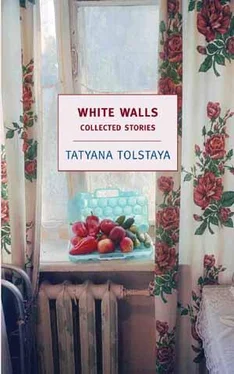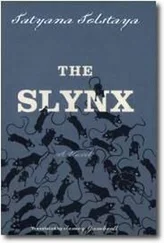It was impossible, for instance, to take my suitor Valéry seriously: strong and tall, and ardently admiring himself for these qualities, with the face of a policeman or an executive, Valéry ate a lot of meat, kept weights, springs, a bicycle, skis, and other unnecessary sports thingamajigs at home; his dream was to buy a blue jacket with metallic buttons, but none could be found for love or money. Without the jacket Valéry felt himself to be out of life’s mainstream. Once we took a walk in the autumn along the windy embankment of the Yauza: it was a cold, orange evening, the last leaves were flying about, a clear star shone in the sky, and there was a feeling of winter’s closeness in the air, a feeling of melancholy, of the meaningless, ineluctably nearing New Year; the wind rose and tossed freezing urban dust at us. Valéry stopped and burst into tears. I stood there, waiting through it, looking at the sky and the star in the emptiness. I understood that words meant nothing, that no comfort was needed, I understood that this was grief, failure, ruin: the blue jacket had gone out of fashion, floating by Valéry; like a rosy morning cloud, an ephemeral vision, cranes flying overhead, or an angel in the lunar heights, the jacket sailed off—it had beckoned, agitated, clouded his soul, entered his dreams, and passed, just as the luxurious, colorful, spicy empires of the East had passed, resounding and shining. Having cried his fill, Valéry wiped his rigid Komsomol face with a red hand, and we went on, hushed and sad, and parted at the vegetable store on the corner, never to meet again.
Neither was Garik, a spiritual man, a suitable fiance. Not that the constant searches of his kennel bothered me: the government kept attacking Garik, confiscating his spiritual papers and pictures, taking away his favorite books, and sometimes picking up Garik himself. It’s not that I was scared off by his six children from his former wife—Garik was a kind, loving, sweet, and unusually resourceful young man: he managed to feed the children, and indefatigably bustling about, he somehow quickly resurrected the papers at the same time. But I got sort of bored listening to him—everything was “vineyards” and more “vineyards,” and paths, and quests, and bliss, and the sweetest and not of this world, and yet life went on—a bad life, but the only one around, and his den was full of rubbish, rags, dust, and glue bottles on the windowsills, and meatless porridge in a burned pot, and tatters on a wobbly nail… and could it really be that this, this puny, ugly world, was the one whispered about and promised, proclaimed and presaged when everything began, when the unseen gates opened and the inaudible gong sounded?
To tell the truth, love was what I wanted, and it was there too, because love is always there, right here inside you, only you don’t know whom to share it with, whom you can entrust with carrying such a marvelous, heavy burden—this one’s a bit weak, and that one will tire quickly, and those—you should run from as fast as you can, before they’ve grabbed you like a jam roll on sale near the store Children’s World, slapping down a coin and wrapping up their catch in oiled paper.
Yes, I wanted something… something that would be heavier than Valery’s weights and lighter than Garik’s homespun wings. I wanted to travel or just leave, or talk for a long, long time, and maybe listen, and I imagined an indistinct traveling companion, friend, passerby, and the road appeared dimly: a path at nighttime, the fusty scent of rot, drops from wet bushes, laughter in the dark and a light ahead, a wooden house and a washed floor, and a book in which everything was written—and the sound of the high, unseen trees all night long until morning.
And also… but it doesn’t matter. There was reality: the kitchen, the shouts, the gray stubble of Spiridonov’s beard diving into a glass of tea, the crowdedness and the two of them, this unnatural pair with far-flung plans. We closed the window tight, so as not to hear the distant, needle-sharp, endless, tormenting cry of Uncle Zhenya.
“You know what, old girl,” Lyonechka hinted, “if the fate of Russian letters is dear to you, why not bring the cot out into the kitchen?”
I didn’t want to sleep in the kitchen, or “go out for a walk,” or spend a week in Friazino, and Spiridonov didn’t want to either. But Lyonechka swore, fought, and cursed Spiridonov and me—both privately, as a matter of course, and in poems, for eternity—and bought us tickets to a double feature with news-reels.
Spring was in the air—cold, nocturnal. The wind already droned in the trees, and water flew in the wind, and birds, cawing, bunched in billows in transparent trees, on rusty domes; clear puddles trembled, reflecting the lights of stands selling dumplings, vodka, and meat pies; and alarm, life, and desire breathed, sailed, and ran in the air—common property, unclaimed, no one’s. I shuffled arm in arm with the gloomy, foot-dragging invalid Spiridonov along the crooked lanes, under Moscow’s Muslim moon, and his foot, laced up in a fourteen-ruble, thirty-kopeck shoe, traced a long, meandering line through Moscow, as if plowing the barren urban asphalt, as if preparing a furrow for unknowable industrial seeds. And then, hunkered down in our damp coats in the movie theater, the invalid and I sullenly watched some fleetingly glimpsed factories, pig iron, awkward heroes of labor, tempered iron beams, tractors, record-setting hogs, bald, well-fed people in tweed suits rubbing ears of wheat between their fingers; we watched the stream of ideologically consistent grain flood us; we watched, waiting submissively for the friendship of homeless people to gel somewhere out there in the form of the illegal infant Pushkin, our last hope.
By summer there was still no Pushkin, and my life had become completely unbearable: the international lovers had made themselves at home in my room, they ate noodles straight from the pot, played the zurna, walked around naked, and even tried to start a campfire on the floor on a sheet of metal; for scientific entertainment Lyonechka bought Judy some white mice and a white tomcat; being a convinced pacifist, Lyonechka imposed his views on the cat—he developed a system of enlightening lectures and conducted practical seminars on restraint from mouse eating.
The Hannibals were always short of money. Lyonechka got a half-time job for a while working on a women’s daybook calendar as an ethnic cuisine columnist. But here, too, love of truth did him poor service, because no one at the calendar wanted base truths, critical harping, and exposes, they didn’t want the recipe for May salad to start with the words: “Let’s be frank—there ain’t nothin’ to eat.” They didn’t want missives and sermons like: “Ladies, if you can afford to buy tomatoes at the market, stop and ask yourselves: Have you been living the right life? Where did you sin? When did you take the wrong step, turning from the narrow path of virtue onto the beaten track of temptation?…” And he was fired again, and again he was proud and indignant and immediately picked up a couple of friends, or rather pupils and followers: bearded guys dressed in rumpled clothes, draped with crosses and bells, with wandering smiles and aloof, bovine gazes, and, inviting them home— to my place, that is—he gave them edifying lectures, taught them to choose the unfalse path, and produced as a living visual aid the cat, who, having experienced the power of the True Word, had already become the most perfect Buddhist and had transcended all earthly, ephemeral, and scurrying things.
A warm summer, an emptied, Sunday city—I would go out to wander the side streets, choosing the old, dark corners where it smells of beer spilled in the dust, of cheap stucco, of the wood fences of construction sites, places where shingles stick out of the walls of buildings, and dandelions—no matter how you trample them—innocently and stupidly sprout at the foot of sheds and temples from the time of Ivan Kalita. The grave luster of a church dome in the distance, the meaningless, unceasing rustle of already darkening leaves, fleet coins of sun, rags, and reek around garages, grass in linden shadow and bald earth patches in the courtyards where laundry hangs to dry— this was where I was to live and die, not meeting a soul, not speaking a word to anyone.
Читать дальше












